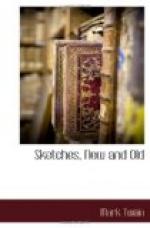The sympathy existing between these two brothers is so close and so refined that the feelings, the impulses, the emotions of the one are instantly experienced by the other. When one is sick, the other is sick; when one feels pain, the other feels it; when one is angered, the other’s temper takes fire. We have already seen with what happy facility they both fell in love with the same girl. Now Chang is bitterly opposed to all forms of intemperance, on principle; but Eng is the reverse—for, while these men’s feelings and emotions are so closely wedded, their reasoning faculties are unfettered; their thoughts are free. Chang belongs to the Good Templars, and is a hard—working, enthusiastic supporter of all temperance reforms. But, to his bitter distress, every now and then Eng gets drunk, and, of course, that makes Chang drunk too. This unfortunate thing has been a great sorrow to Chang, for it almost destroys his usefulness in his favorite field of effort. As sure as he is to head a great temperance procession Eng ranges up alongside of him, prompt to the minute, and drunk as a lord; but yet no more dismally and hopelessly drunk than his brother, who has not tasted a drop. And so the two begin to hoot and yell, and throw mud and bricks at the Good Templars; and, of course, they break up the procession. It would be manifestly wrong to punish Chang for what Eng does, and, therefore, the Good Templars accept the untoward situation, and suffer in silence and sorrow. They have officially and deliberately examined into the matter, and find Chang blameless. They have taken the two brothers and filled Chang full of warm water and sugar and Eng full of whisky, and in twenty-five minutes it was not possible to tell which was the drunkest. Both were as drunk as loons—and on hot whisky punches, by the smell of their breath. Yet all the while Chang’s moral principles were unsullied, his conscience clear; and so all just men were forced to confess that he was not morally, but only physically, drunk. By every right and by every moral evidence the man was strictly sober; and, therefore, it caused his friends all the more anguish to see him shake hands with the pump and try to wind his watch with his night-key.
There is a moral in these solemn warnings—or, at least, a warning in these solemn morals; one or the other. No matter, it is somehow. Let us heed it; let us profit by it.
I could say more of an instructive nature about these interesting beings, but let what I have written suffice.
Having forgotten to mention it sooner, I will remark in conclusion that the ages of the Siamese Twins are respectively fifty-one and fifty-three years.
Speech at the Scottish banquet in London—[Written about 1872.]
On the anniversary festival of the Scottish Corporation of London on Monday evening, in response to the toast of “The Ladies,” Mark Twain replied. The following is his speech as reported in the London Observer:




